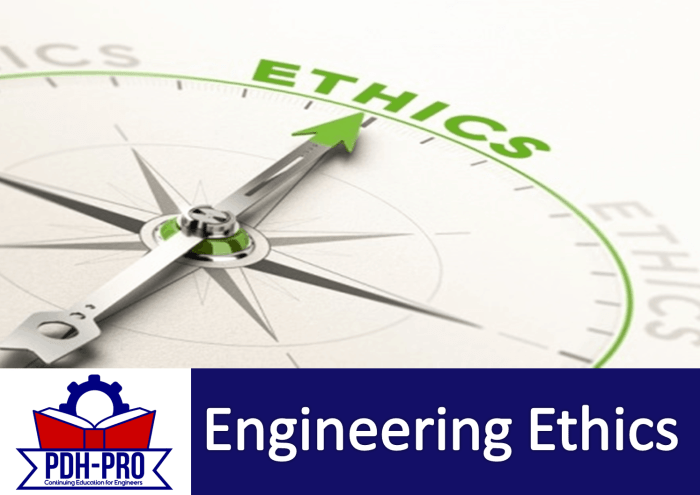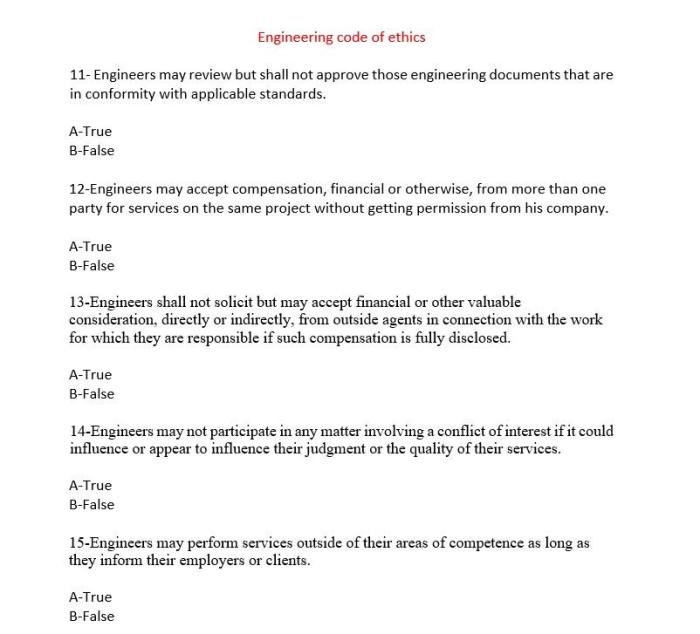Texas board of professional engineers ethics exam answers – Delve into the intricacies of the Texas Board of Professional Engineers Ethics Exam with our comprehensive guide. Prepare to navigate the exam’s challenges, understand ethical principles, and make informed decisions that uphold the integrity of the engineering profession.
Our in-depth analysis covers exam content, preparation strategies, and real-world ethical considerations. By exploring the consequences of ethical violations and leveraging valuable resources, you will gain the knowledge and confidence to excel in the exam and beyond.
Texas Board of Professional Engineers Ethics Exam Overview

The Texas Board of Professional Engineers Ethics Exam is a mandatory requirement for engineers seeking licensure in the state of Texas. This exam assesses the ethical principles and responsibilities of engineers and their ability to apply them in professional practice.
The exam consists of 100 multiple-choice questions and must be completed within 3 hours. It covers a wide range of ethical concepts, including:
- Engineering ethics and professional conduct
- Public safety and welfare
- Conflict of interest
- Confidentiality
- Environmental stewardship
Exam Content and Coverage
The Texas Board of Professional Engineers Ethics Exam is divided into five sections, each covering a specific aspect of engineering ethics:
Section 1: Engineering Ethics and Professional Conduct, Texas board of professional engineers ethics exam answers
This section covers the fundamental principles of engineering ethics, including the NSPE Code of Ethics, the Texas Engineering Practice Act, and the ethical decision-making process.
Section 2: Public Safety and Welfare
This section focuses on the engineer’s responsibility to protect the public safety and welfare, including topics such as product safety, environmental protection, and whistleblower protection.
Section 3: Conflict of Interest
This section examines the ethical issues surrounding conflicts of interest, including the identification and disclosure of potential conflicts, and the avoidance of actual conflicts.
Section 4: Confidentiality
This section covers the ethical obligations of engineers to maintain confidentiality, including the protection of client information, trade secrets, and proprietary data.
Section 5: Environmental Stewardship
This section addresses the ethical responsibilities of engineers to protect the environment, including the consideration of environmental impacts, the promotion of sustainable practices, and the minimization of pollution.
Exam Preparation Strategies
Effective preparation for the Texas Board of Professional Engineers Ethics Exam is crucial for success. Here are some strategies to consider:
- Review the NSPE Code of Ethics and the Texas Engineering Practice Act thoroughly.
- Familiarize yourself with the exam format and content coverage.
- Utilize study materials such as practice exams, textbooks, and online resources.
- Prioritize studying based on the exam content coverage and your areas of weakness.
- Take practice exams to assess your understanding and identify areas for improvement.
Ethical Considerations in Engineering Practice

Engineers in the state of Texas have a duty to uphold ethical principles in their professional practice. These principles include:
- Protecting the public safety and welfare
- Acting with integrity and honesty
- Avoiding conflicts of interest
- Maintaining confidentiality
- Promoting environmental stewardship
Engineers must be aware of the ethical implications of their decisions and actions and must strive to make ethical choices that align with their professional responsibilities.
Consequences of Ethical Violations
Violations of ethical principles in engineering practice can have serious consequences, including:
- Disciplinary action by the Texas Board of Professional Engineers
- Loss of license
- Civil and criminal penalties
- Damage to reputation
Engineers must be aware of the potential consequences of unethical behavior and must take steps to avoid violating ethical principles.
Resources for Ethical Guidance

Several resources are available to provide guidance on ethical issues in engineering:
- National Society of Professional Engineers (NSPE) Code of Ethics
- Texas Board of Professional Engineers Rules of Professional Conduct
- American Society of Civil Engineers (ASCE) Code of Ethics
- Institute of Electrical and Electronics Engineers (IEEE) Code of Ethics
- American Institute of Chemical Engineers (AIChE) Code of Ethics
These resources provide valuable guidance on ethical decision-making and can help engineers navigate ethical challenges in their professional practice.
Questions and Answers: Texas Board Of Professional Engineers Ethics Exam Answers
What is the purpose of the Texas Board of Professional Engineers Ethics Exam?
The exam assesses candidates’ understanding of ethical principles and their application in engineering practice, ensuring they uphold the profession’s ethical standards.
How many questions are on the exam?
The exam typically consists of 50 multiple-choice questions.
What resources can I use to prepare for the exam?
Study materials include the Texas Board of Professional Engineers’ website, practice exams, and textbooks on engineering ethics.